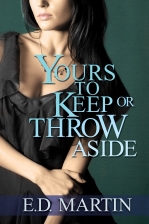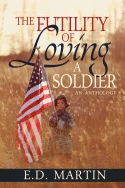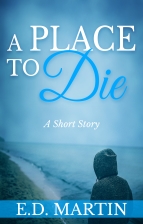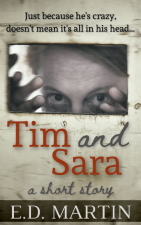Another tip for character development – outtakes! Write a short story using your main characters, and look at it as fulfilling a duel purpose – get to know your characters, and practice your writing skills. Maybe even enter it in a short story contest or something.
In the first chapter of my novel the main characters reminisce about their first date. When I came across an amateur writing contest requesting a 1500 words-or-less story about “a date which ended with a good night kiss, and how that came to be,” I realized that my characters’ date would work perfectly. So, here it is, my first outtake.
******************************
Kasey checked her watch again. Seven-oh-eight. David had said he would pick her up at seven. Why was he late? Maybe he’d spent too much time picking out the perfect shirt. Maybe his car bad broken down. Maybe he had found himself a more attractive date while driving across campus to pick her up. Kasey gave herself a mental shake. First dates always made her nervous.
And then he was there, in front of her dorm, illegally parking an older Honda Civic next to the doors. She hurried out to meet him before campus security noticed him. Sometimes it seemed like they had a sixth sense for parking violations.
“Wow, you look great!” David’s brown eyes took in every detail as she sat got in and pulled the door shut.
“Thanks.” Kasey blushed and looked down at her hands in her lap. She had picked a short black skirt, white silk camisole, and thin gray cardigan, with her dark thick hair pulled into a low ponytail. David had been secretive about the restaurant so she had aimed for something that would work no matter where they went.
“Is Italian okay?” David asked as he pulled away from the curb.
“Yeah, that’s fine. Anything beats the dining hall.”
“At least it’s all-you-can-eat, which works great with the one-third rule.”
“The one-third rule?”
“Yeah, one-third of the stuff you put on your plate is edible.”
Kasey chuckled. “True.”
“I’m glad you said yes.” David reached over and squeezed her hand, then quickly put his back on the steering wheel.
“What do I have to lose?” She grinned at him. “It’ll work out or it won’t; either way I’m getting a free meal.”
David pulled into the parking lot of Carducci’s, a small upscale Italian restaurant. Kasey was impressed; most college guys she had dated were more the Olive Garden type. As the waiter led them to a candle-lit table in a secluded alcove, Kasey mentally promoted David to a new league far above the others.
“How’d you get this table?” she asked him. It was a Friday night and the restaurant was packed.
“Can’t a guy have his secrets?” He grinned at her.
They made small talk as they ate the freshly-baked bread and roasted garlic and waited for the main course to arrive. Kasey worked at their university library between classes as a way to earn extra money, and David, as a pre-law student, spent a substantial amount of time in the building. His casual flirting as he checked out materials had gradually grown into long conversations, and finally he had asked her out to dinner.
As they finished the bread, the conversation died. Kasey tried to think of something to say, something interesting, but nothing came to mind. This was just David, she told herself, the same guy she talked to all the time at the library. But somehow being in the restaurant, on an actual date, transformed him into someone else, someone foreign to her.
David, perhaps sensing the growing awkwardness as well, regarded her seriously. “It’s at this point in a date that I have to ask you a very important question, a question that will determine our compatibility and, ergo, whether there’ll be a second date.”
Kasey swallowed hard. She liked David and didn’t want to mess things up.
“The big question: Batman or Superman?”
“Batman.” No hesitation.
David exhaled. “Good answer! You really had me nervous on that one.”
Kasey threw her straw wrapper at him. “You’re a jerk sometimes, you know that?”
“Yeah, but it only adds to my charm.” He grinned and she shook her head, helpless to keep from smiling back.
At that moment their food arrived. David had ordered shrimp scampi, and Kasey the house lasagna. As the waiter climbed the few steps to their alcove he tripped, spilling his tray of food onto Kasey’s lap. She gasped as the food stained her clothes, then reddened to the color of the sauce as she realized the entire restaurant had turned their eyes to her.
David jumped up. “What the hell do you think you’re doing?” he forcefully demanded of the waiter. “How could you be so clumsy?”
“I apologize, sir,” stammered the waiter. “It was an accident!”
“My date’s outfit is ruined!”
“It’s fine, David,” Kasey said, knowing full well that the white shirt, at least, would never come clean. “Please sit down.”
“No, it’s not fine. We come here expecting high standards, and having our dinner dumped on your lap is not part of that!”
“I swear, sir, it was an accident!” The waiter dabbed at the edge of Kasey’s lap with a napkin, and she swatted his hand away, preferring her own administrations over those of a stranger.
“Be that as it may,” David continued in a loud voice, “her clothes are ruined! Something will need to be done about that!”
“I’m trying, sir!” The waiter, near to tears, again attempted to wipe off Kasey’s skirt, and she again swatted him away.
A short balding man approached the table, hands clasped in front of him. “I am so sorry!” he said in a heavy Italian accident. “This should not have happened. Lucas, run and tell the chefs to remake their meals as quickly as possible.”
The waiter dashed off, relief visibly written on his face.
The bald man turned back to Kasey and David. “Of course, sir and madame, we strive for the best possible dining experience. Your meal tonight will be on the house.”
“Thank you, sir,” said Kasey. The other patrons were still watching her table closely. She wished they would focus on their food rather than the spectacle that her date had become.
David remained standing, jaw clenched. “David, sit down please,” she told him.
“What about her clothes?” He waved his hand at Kasey. At that point she had managed to clean the chunks of food off her lap, although an enormous red stain remained.
“That is unfortunate, sir. Would you like me to have your meal put in a box for you?”
“No, I would not like it boxed. Her clothes are ruined because of your waiter. I want you to pay for the drycleaning bill.”
“Sir, as I said, the accident is unfortunate, but you are getting the meal for free.”
“David, it’s fine. Please sit down.”
“No, it’s not fine! I want Mr. Carducci here to pay for the drycleaning!”
“Sir, I must object…”
“Really, it’s fine. Really.”
“No, it’s not. Pay for the drycleaning.”
“David!” Kasey pleaded as his voice grew louder. She wondered if she would fit under the table.
“Please, sir…”
“Is this how you treat your customers?”
Kasey leaned her forehead on her hand and groaned softly. She could feel the eyes of everyone in the restaurant upon her. She wanted to melt onto the floor.
The bald man sensed it as well. “Very well, sir. Send us the drycleaning bill and we’ll pay it as well.”
“Thank you.” David smiled and sat down. “Could we get some more bread while we’re waiting for our food?”
Kasey was quiet on the drive back to her dorm. As soon as possible she wanted to change into pajamas, fall asleep, and pretend that night had never happened.
“That didn’t turn out quite like I’d hoped,” said David as he pulled up to the doors of her building.
“Well, I guess it’s a small relief that you didn’t plan for me to wear dinner.” Kasey gave him a weak smile.
“I did however have this planned.” He leaned over and kissed her softly on the lips. She closed her eyes, delighting in the warmth that spread through her body. He gently placed his hand on her cheek and pulled her closer to him.
She didn’t know if the kiss lasted a second or a minute; she just only knew that David’s lips felt perfect on hers and she didn’t want him to stop kissing her.
The moment was over too soon, however, as seemed to be the case for most perfect kisses. A tap on the window broke them apart. David turned away from Kasey, regretfully it seemed, and rolled down his window.
“Sir, you can’t park here,” said the security guard standing next to the car.
“Alright, fine, I’m almost done,” David told him.
“For tonight.” Kasey smiled. “Should we try burgers tomorrow?”






